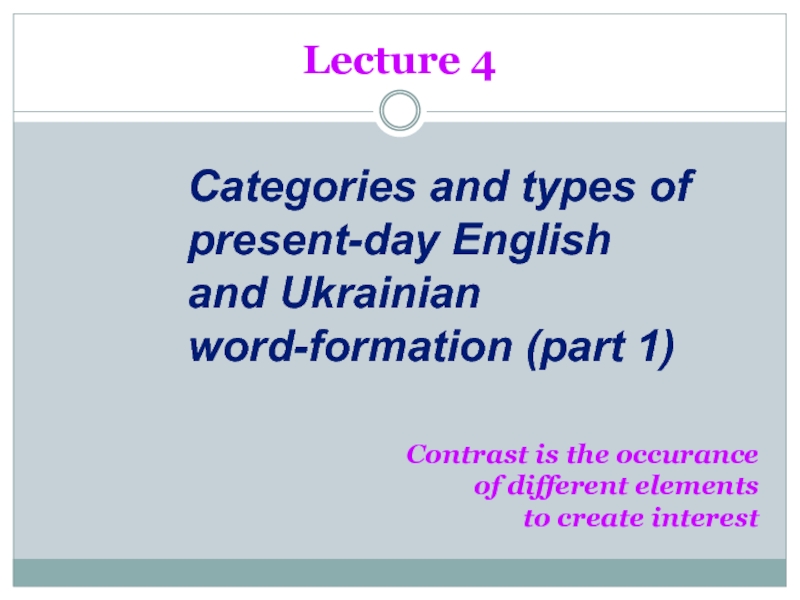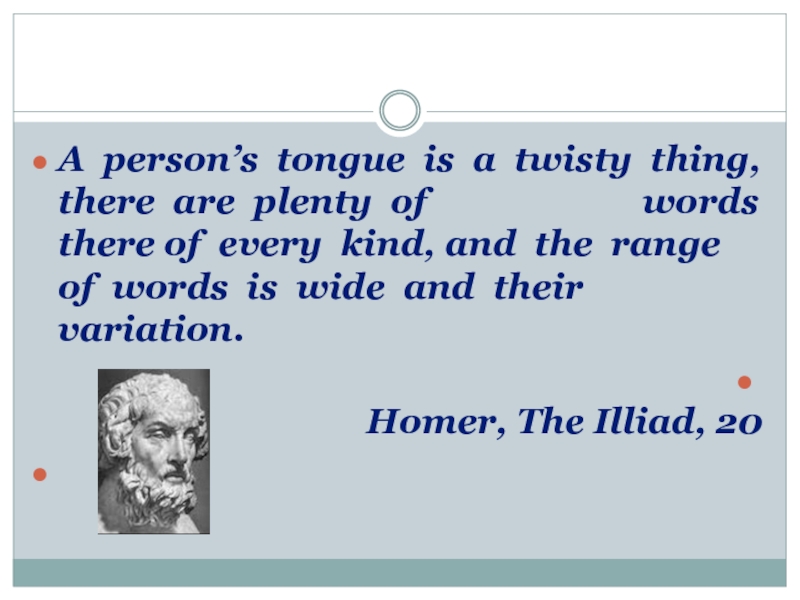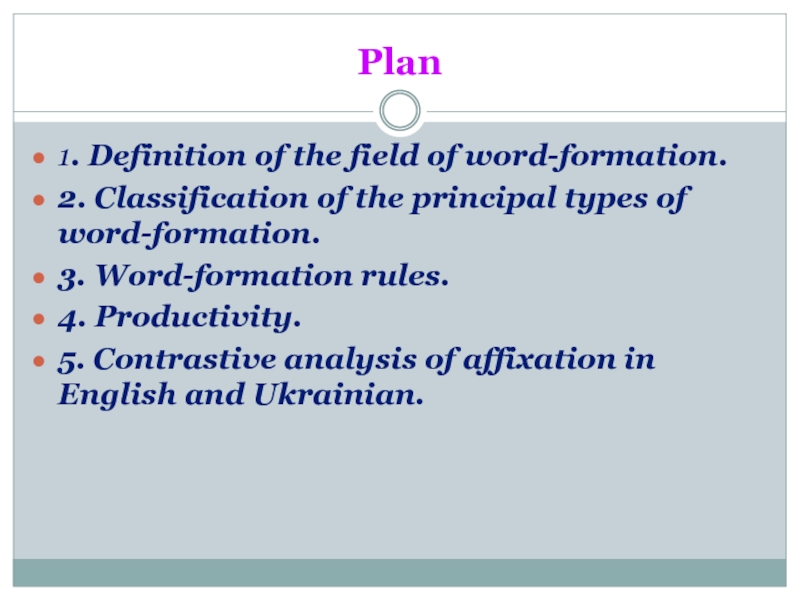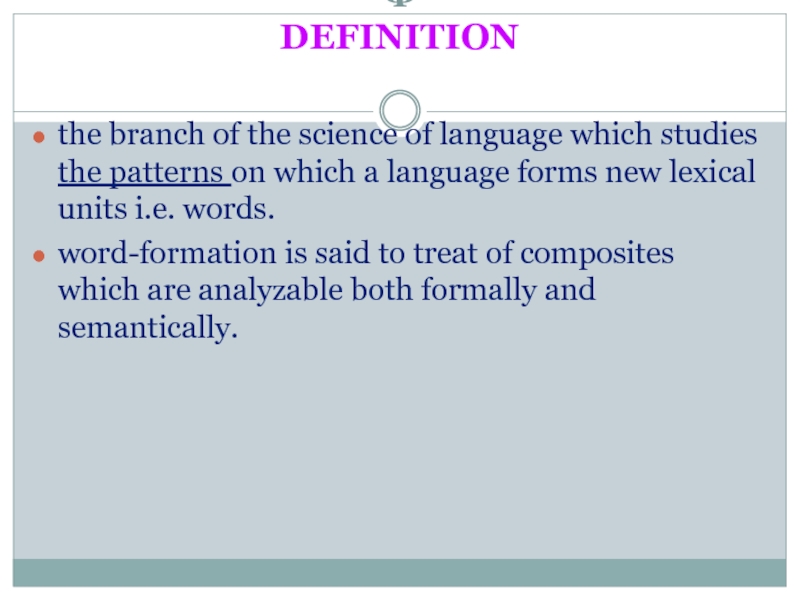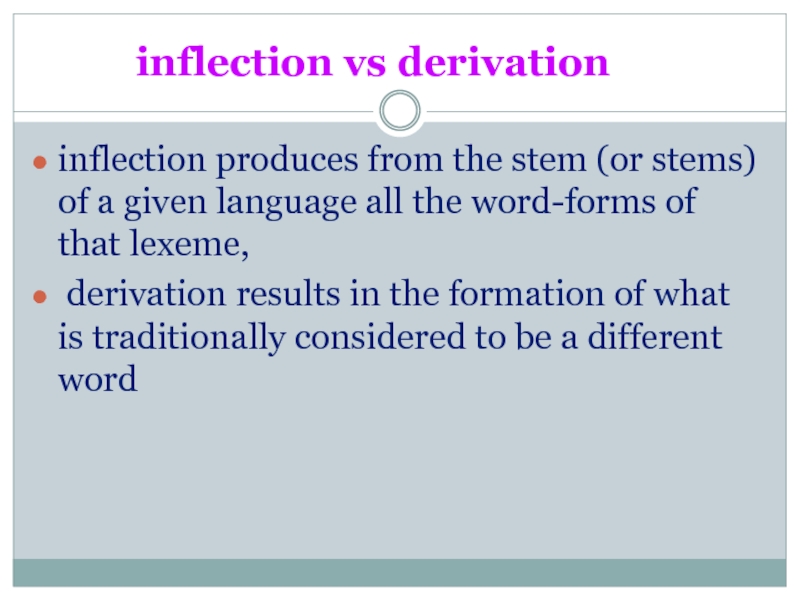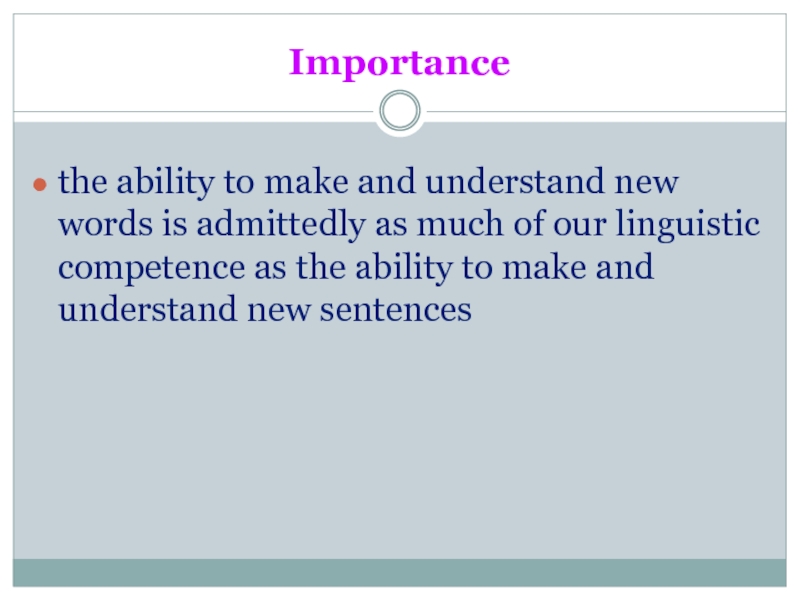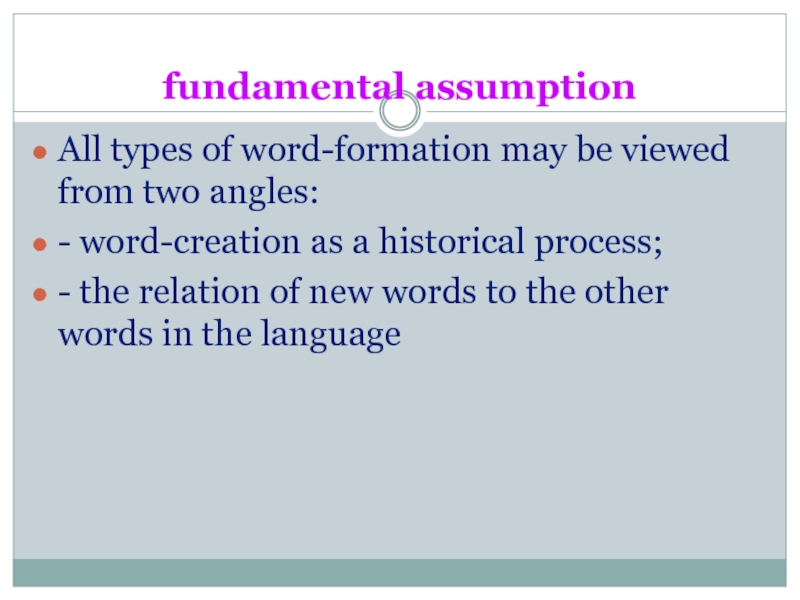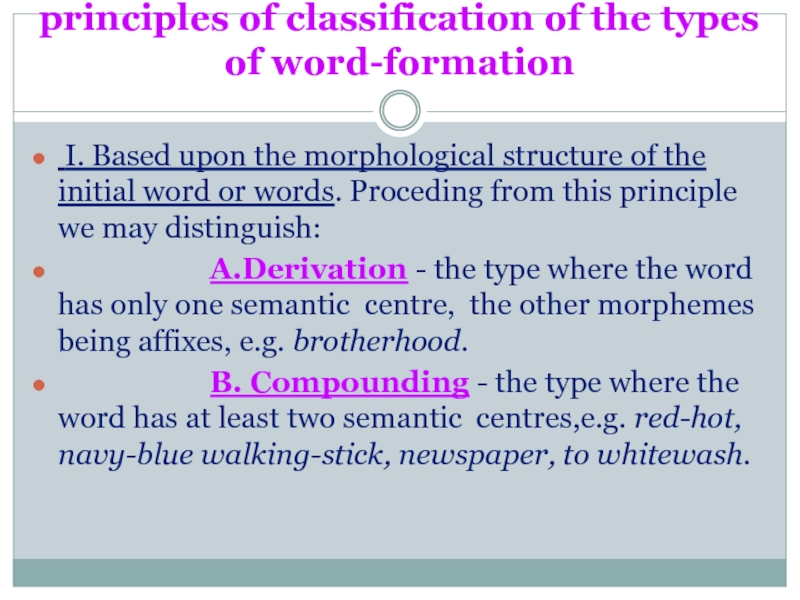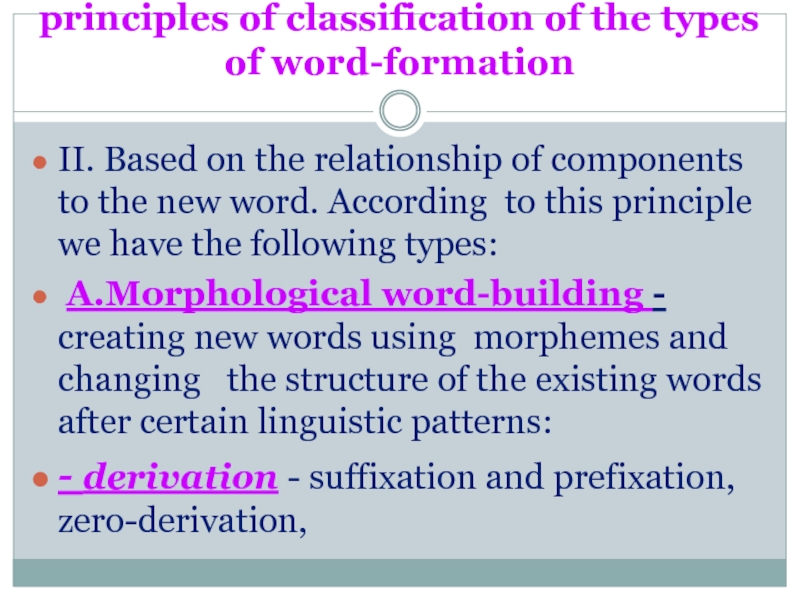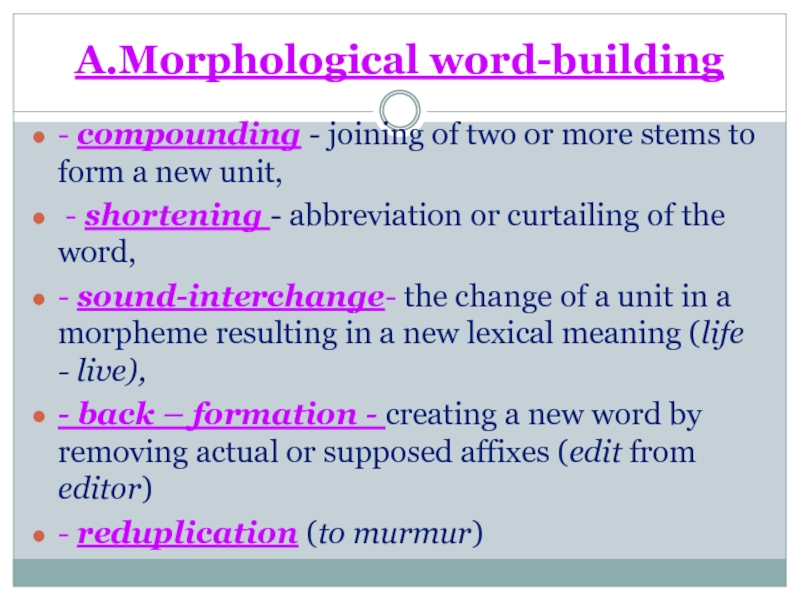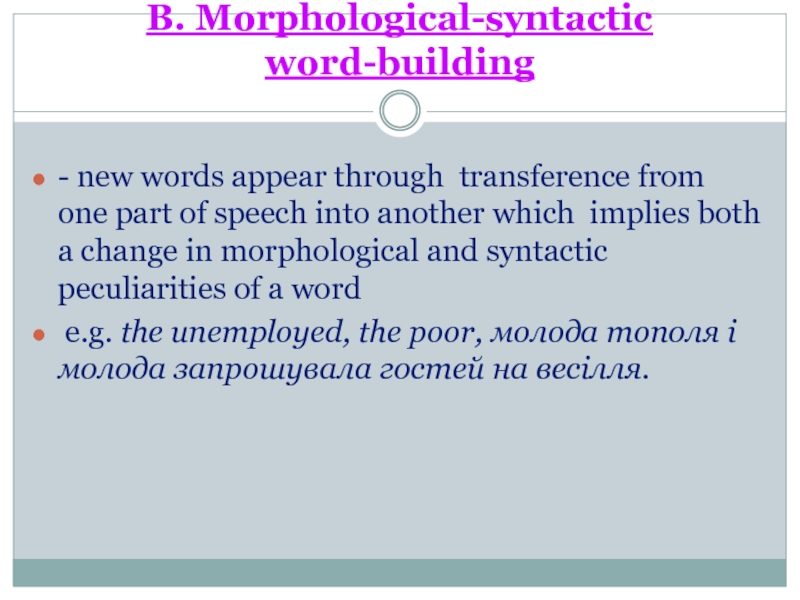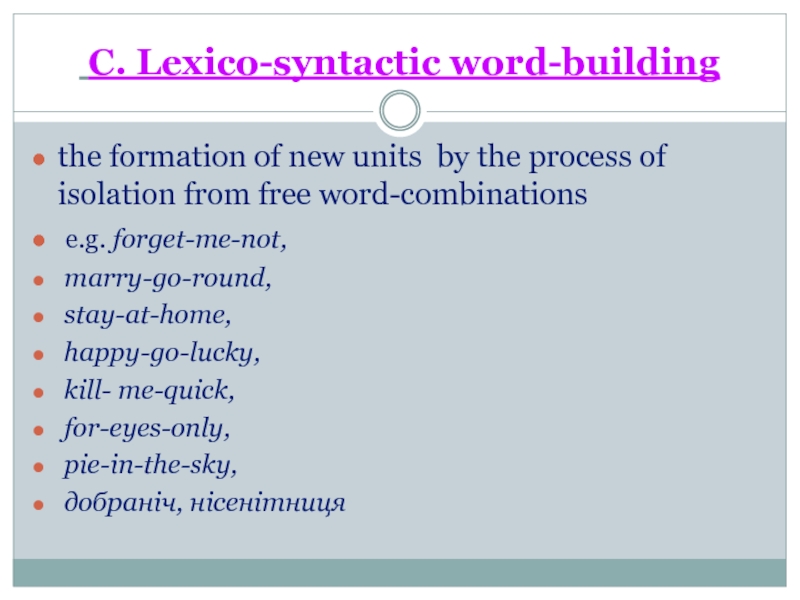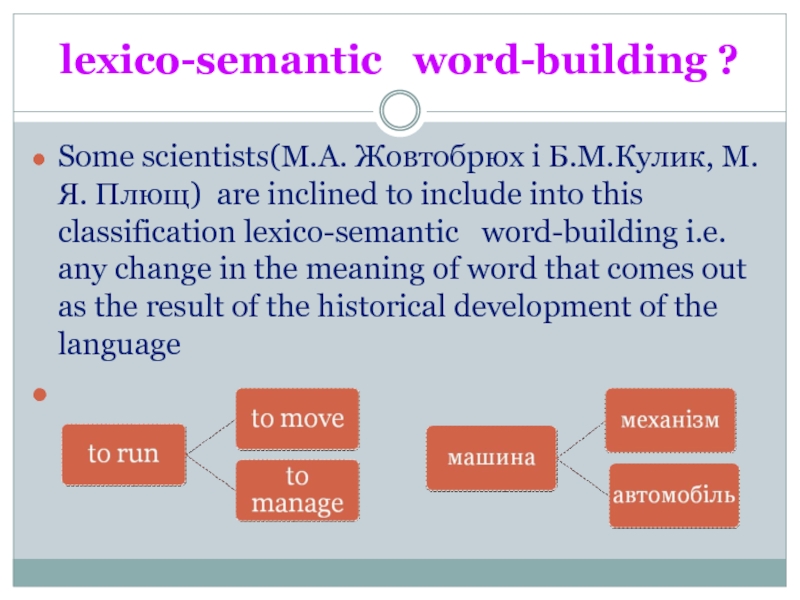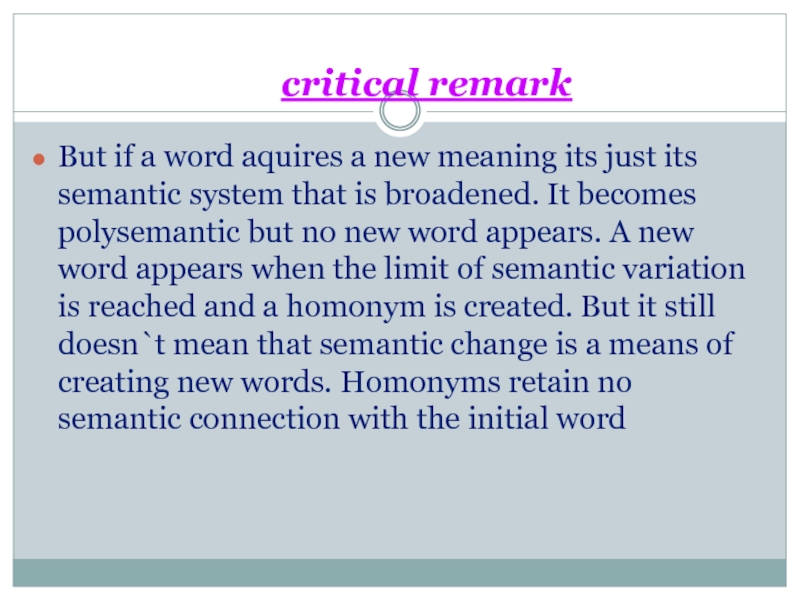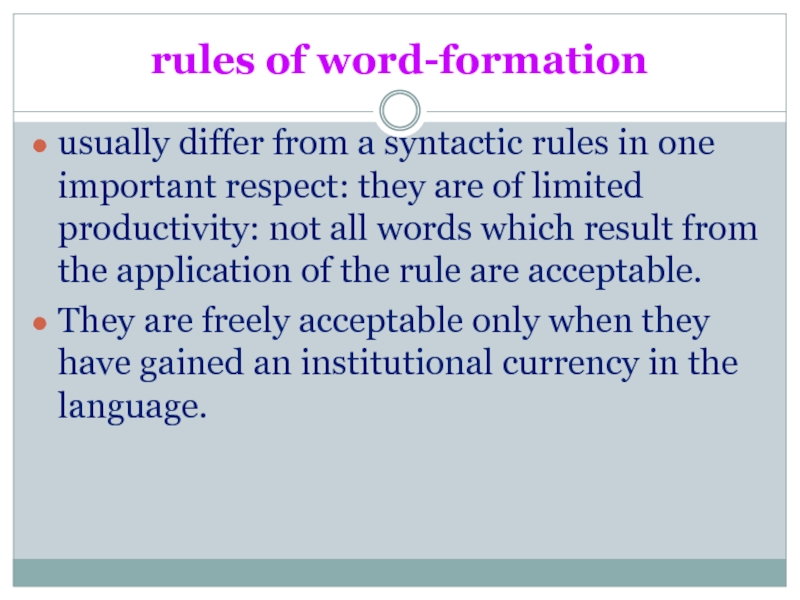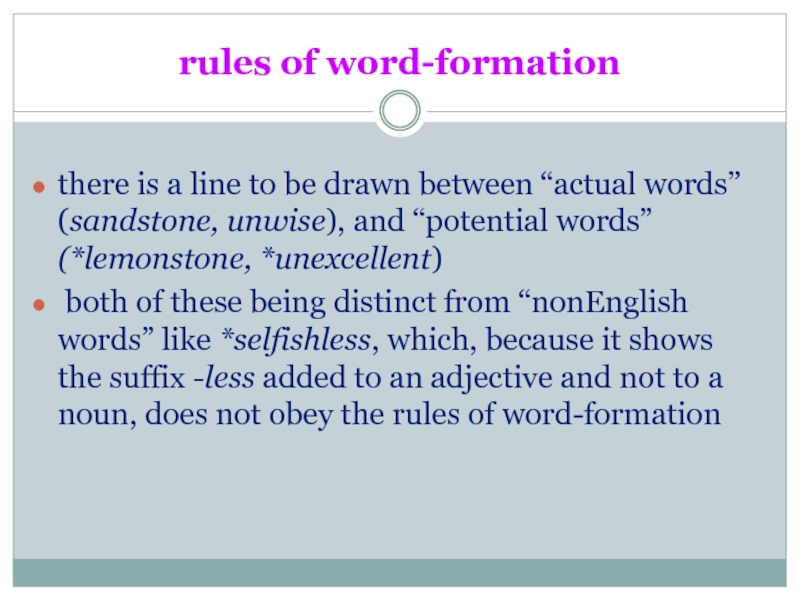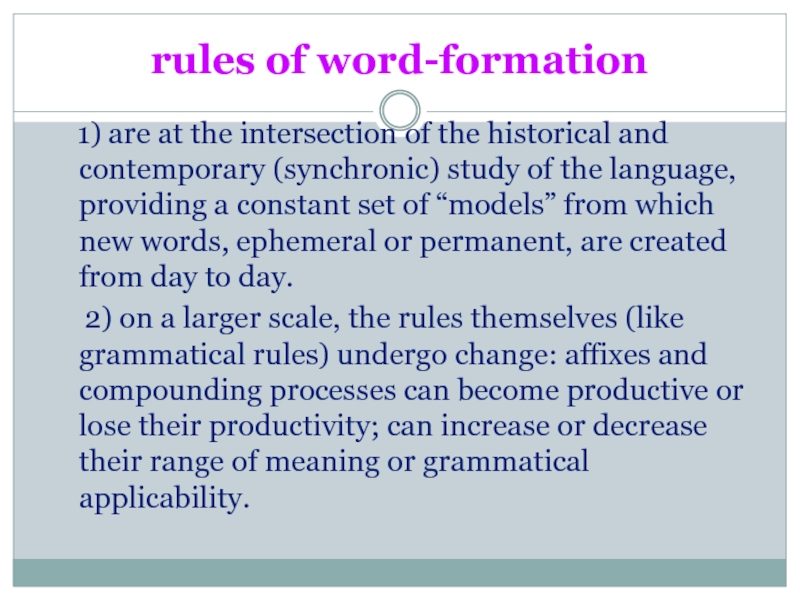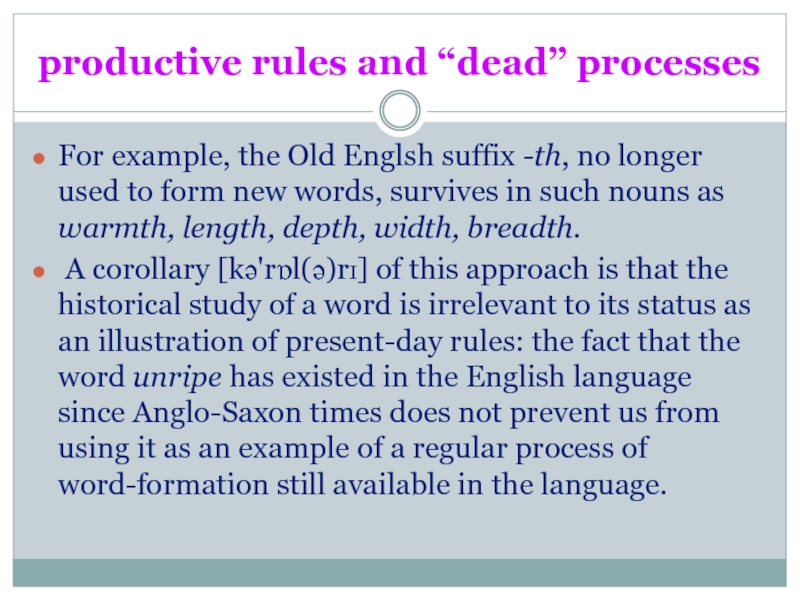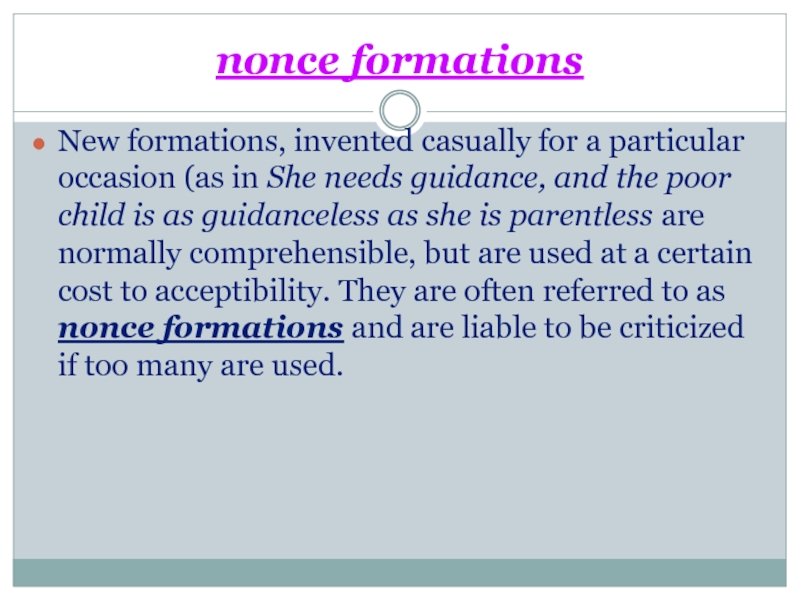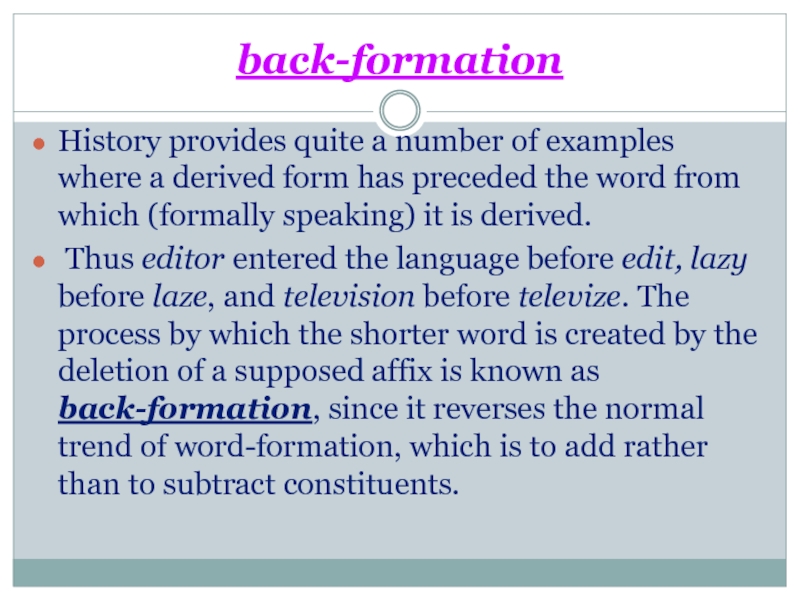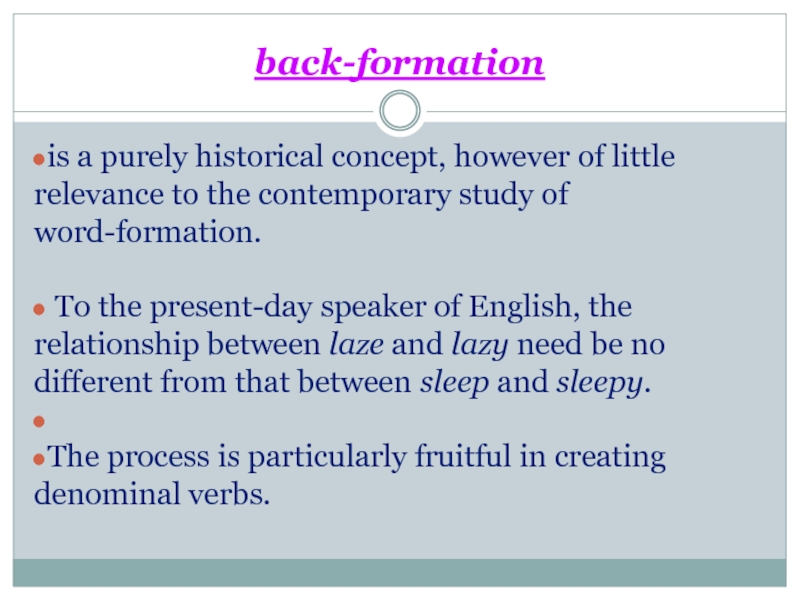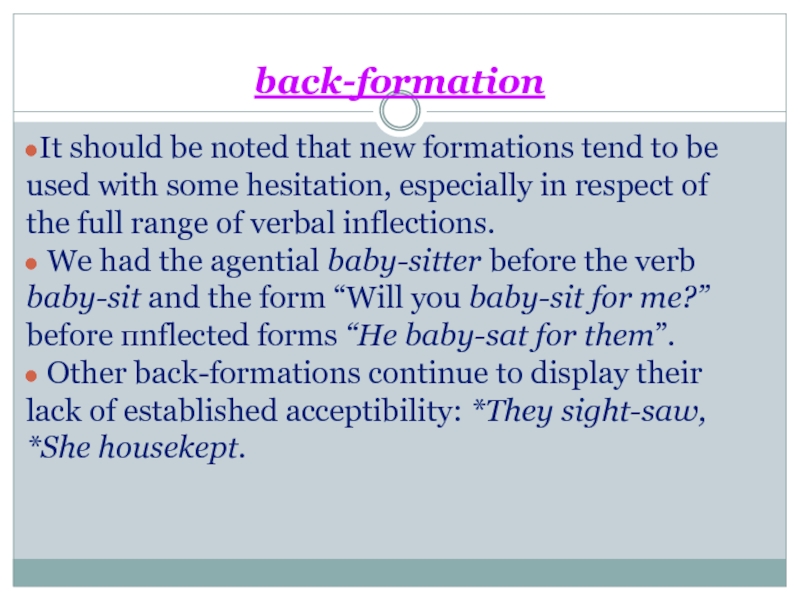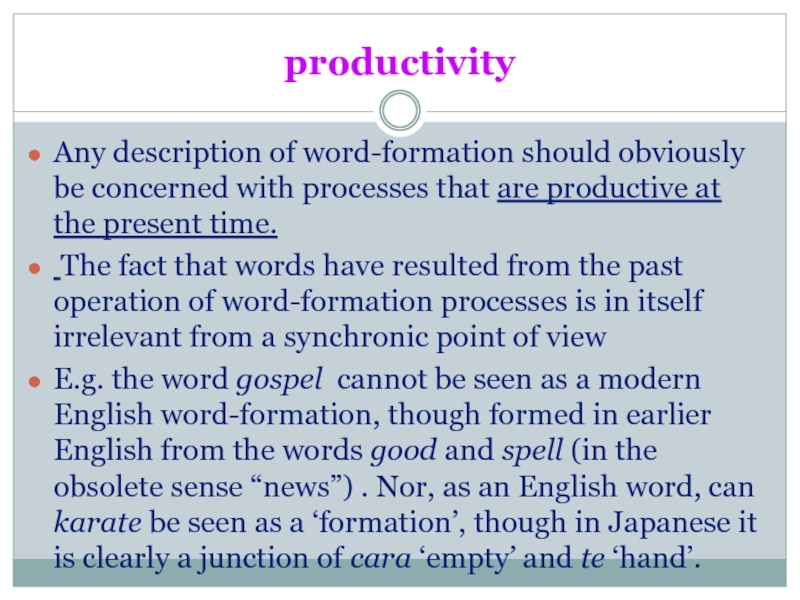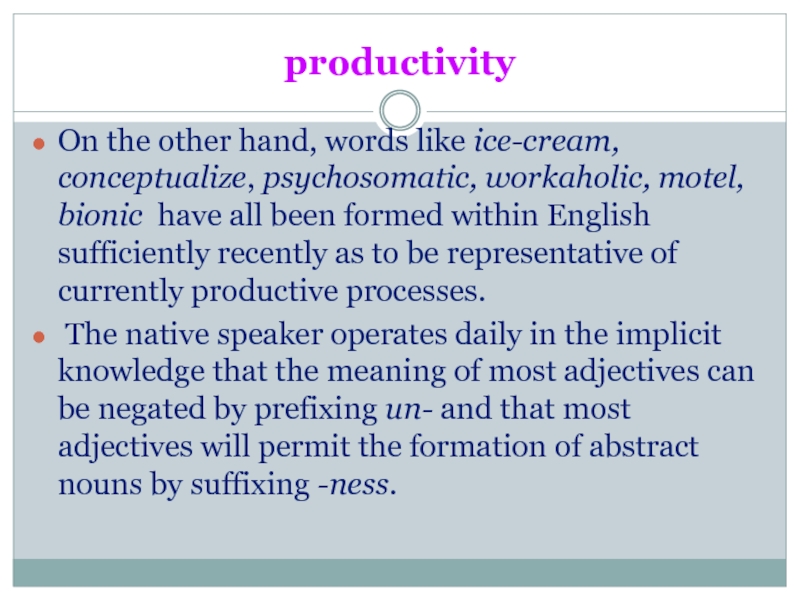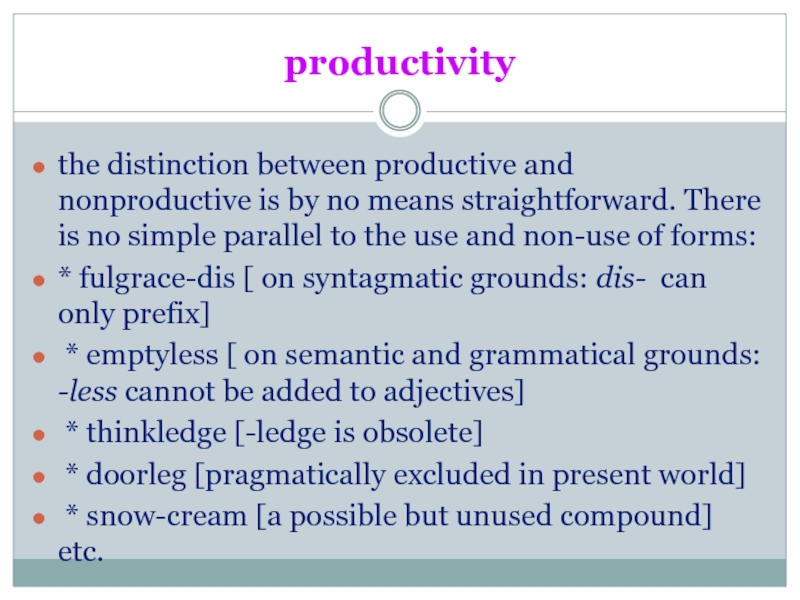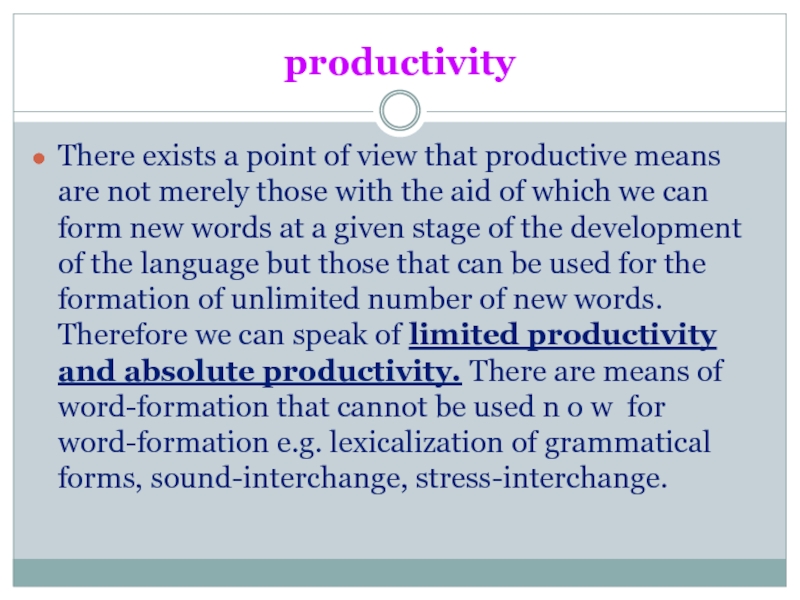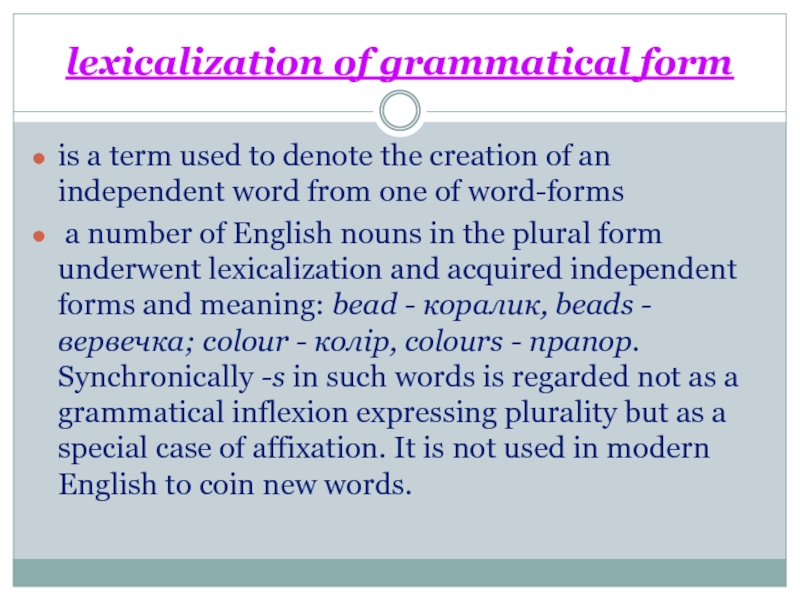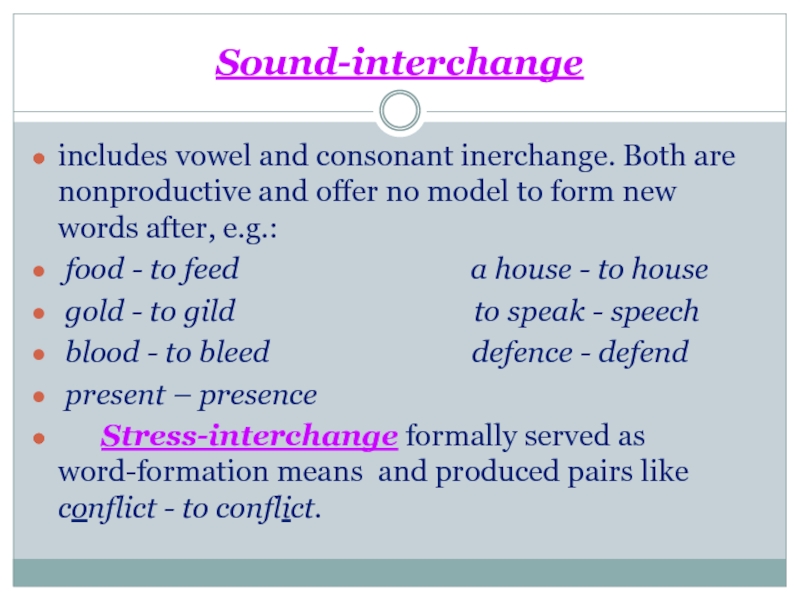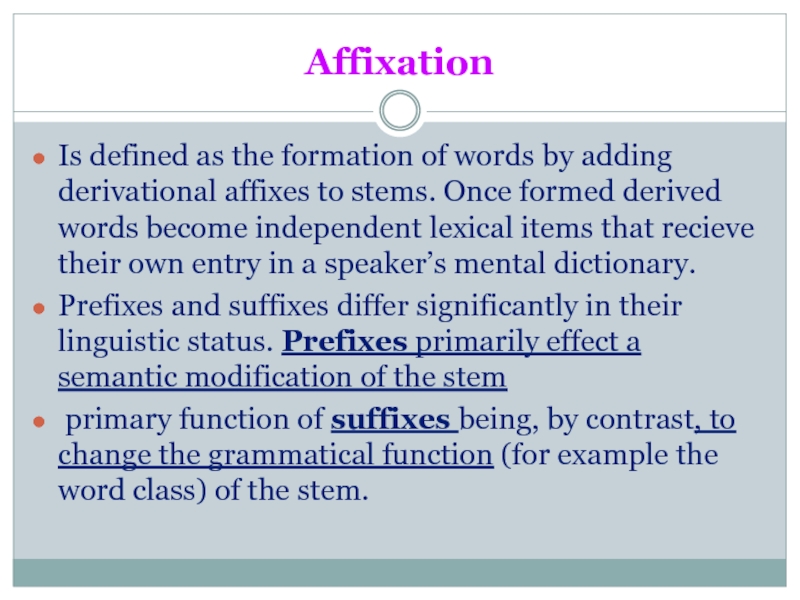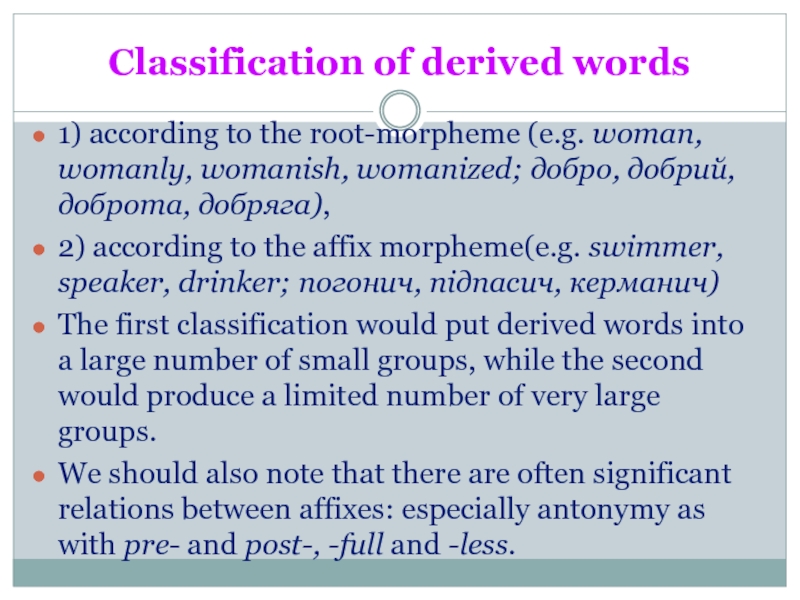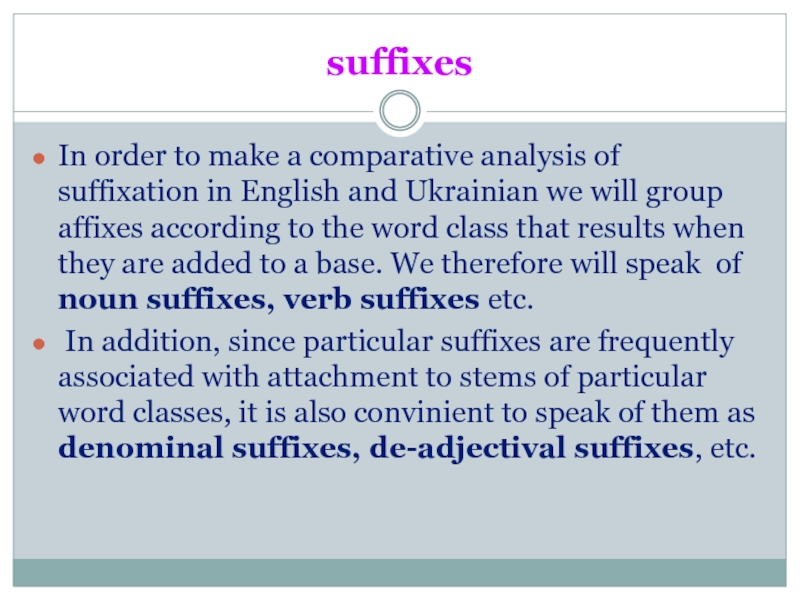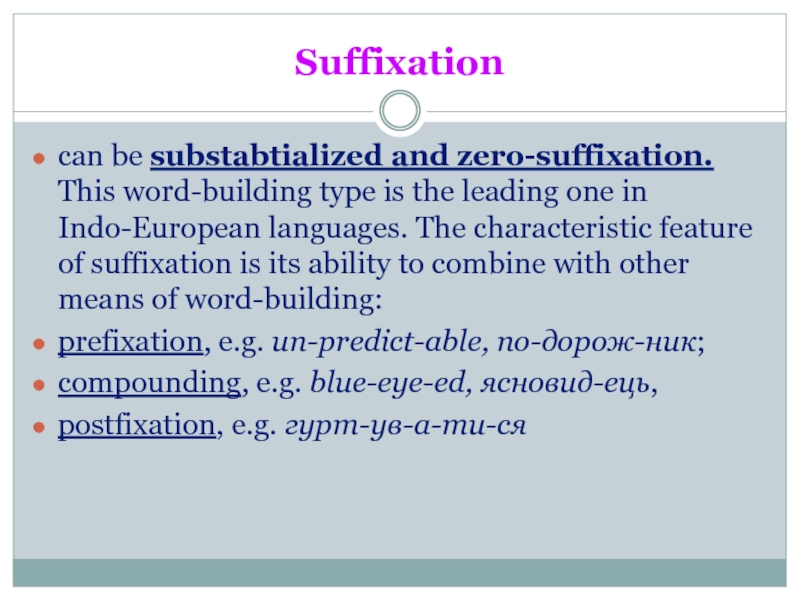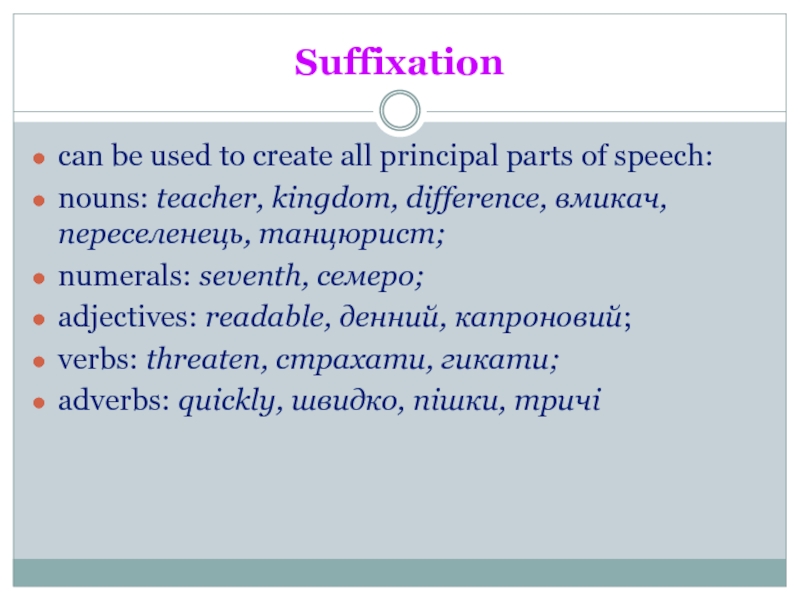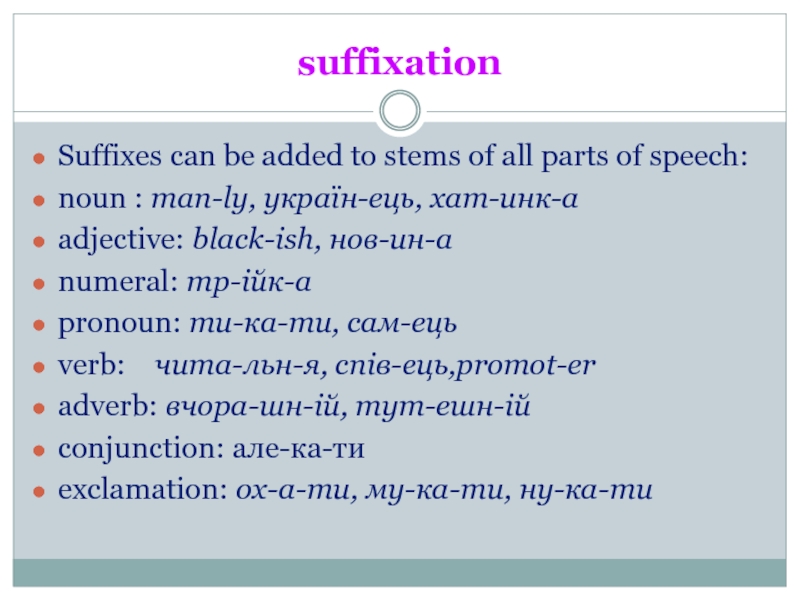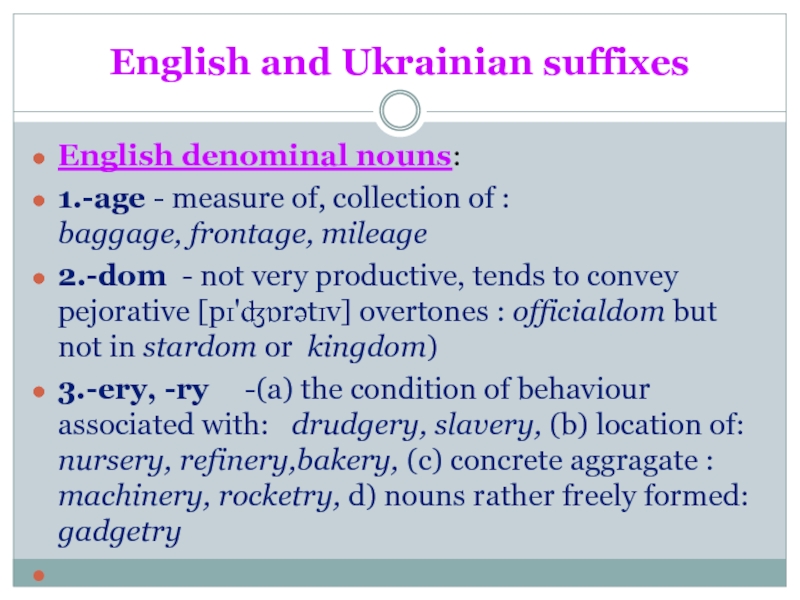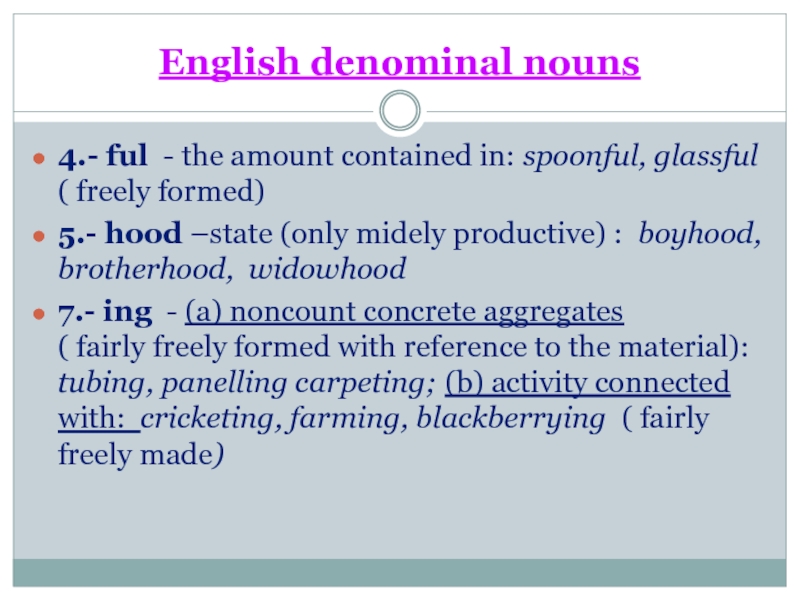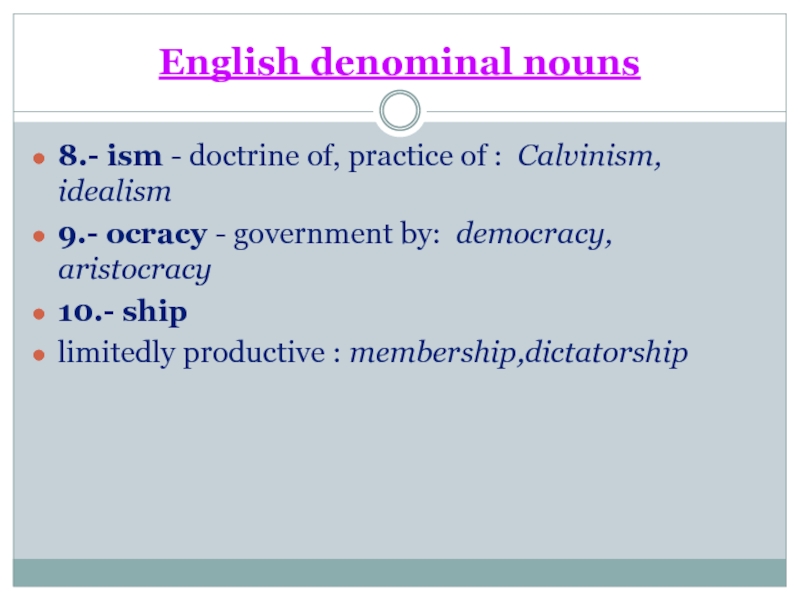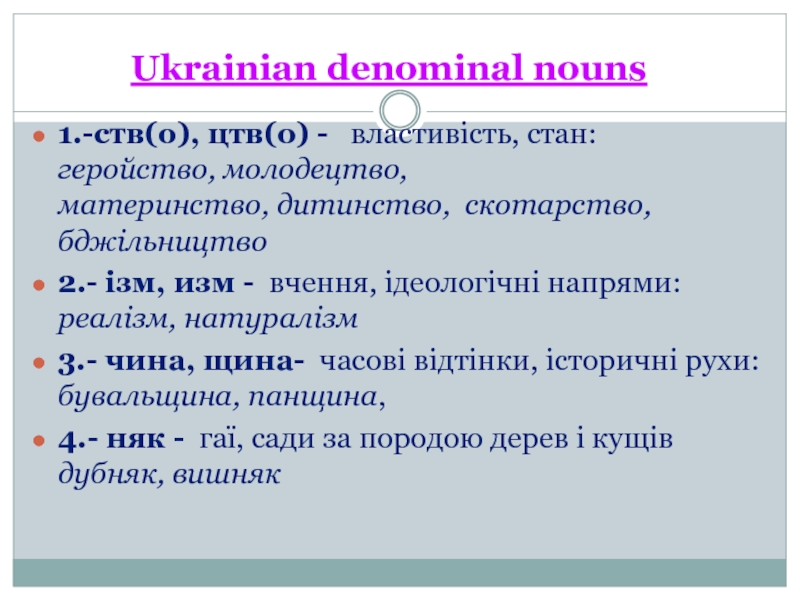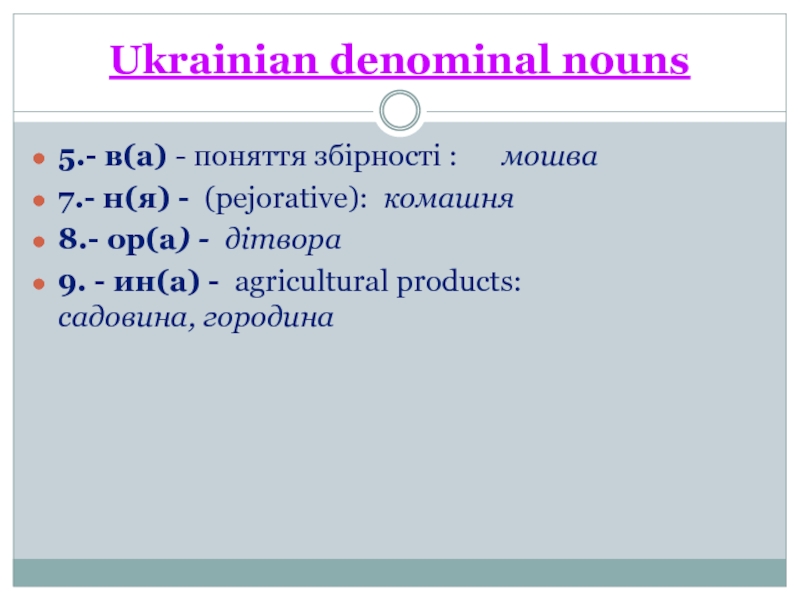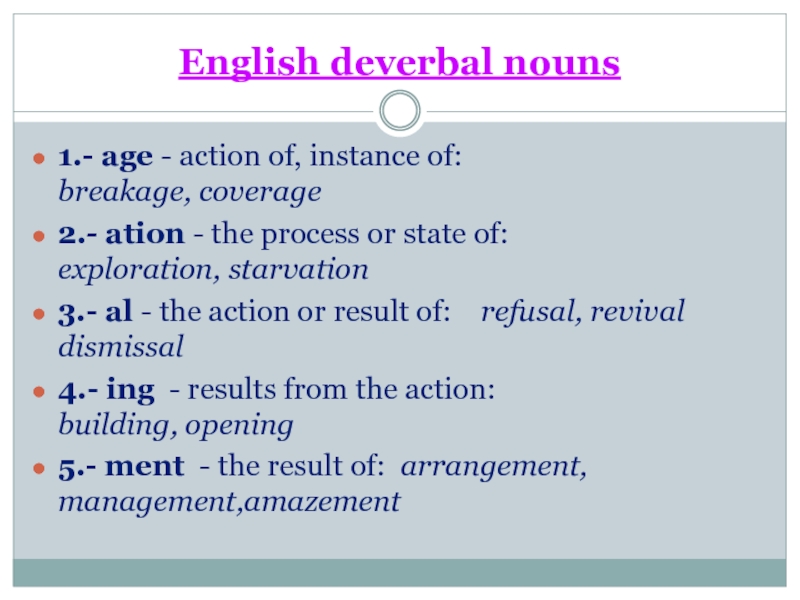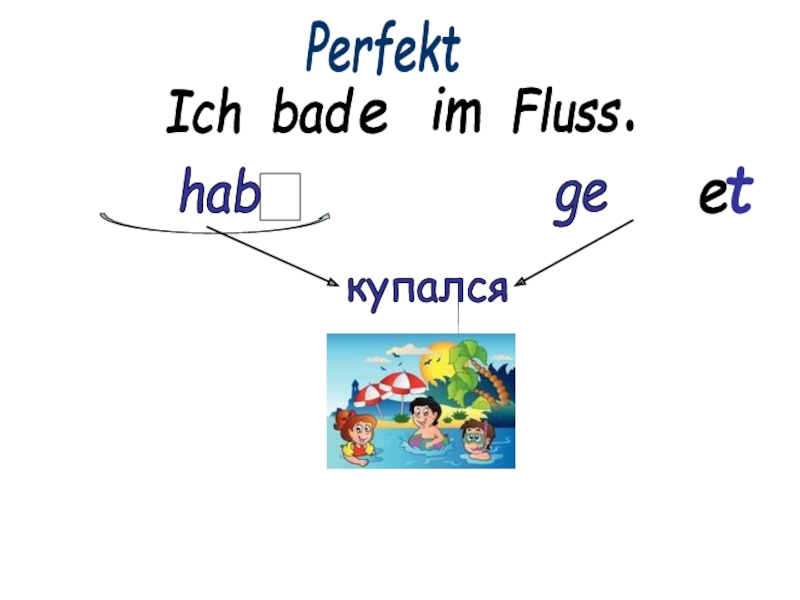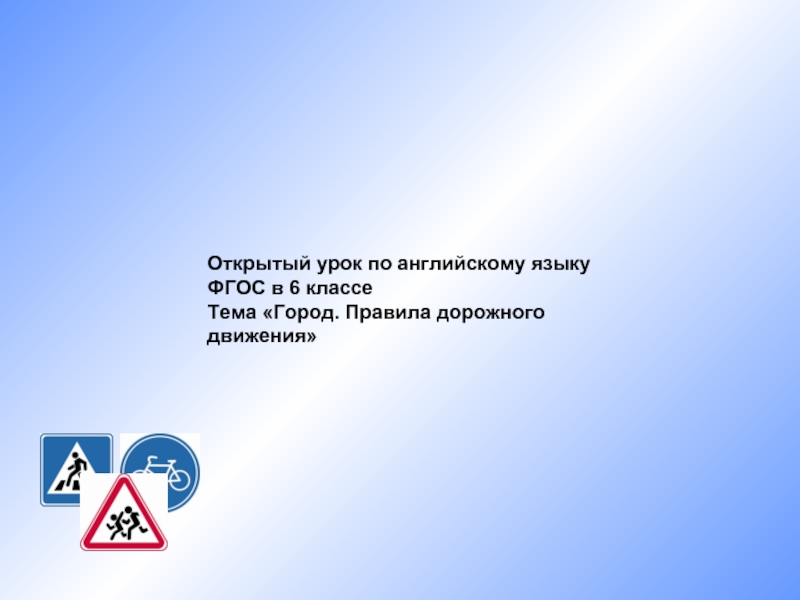translation studies and contrastive linguistics named after Hryhoriy Kochur
Nadiya Andreichuk, associate-professor
nadiyaan@gmail.com
- Главная
- Разное
- Дизайн
- Бизнес и предпринимательство
- Аналитика
- Образование
- Развлечения
- Красота и здоровье
- Финансы
- Государство
- Путешествия
- Спорт
- Недвижимость
- Армия
- Графика
- Культурология
- Еда и кулинария
- Лингвистика
- Английский язык
- Астрономия
- Алгебра
- Биология
- География
- Детские презентации
- Информатика
- История
- Литература
- Маркетинг
- Математика
- Медицина
- Менеджмент
- Музыка
- МХК
- Немецкий язык
- ОБЖ
- Обществознание
- Окружающий мир
- Педагогика
- Русский язык
- Технология
- Физика
- Философия
- Химия
- Шаблоны, картинки для презентаций
- Экология
- Экономика
- Юриспруденция
Lecture 4 Categories and types of present-day English and Ukrainian word-formation (part 1) презентация
Содержание
- 1. Lecture 4 Categories and types of present-day English and Ukrainian word-formation (part 1)
- 2. Lecture 4 Categories and types of present-day
- 3. A person’s tongue is a twisty
- 4. Plan 1. Definition of the field
- 5. Ф DEFINITION the branch of
- 6. inflection vs derivation inflection produces from the
- 7. Importance the ability to make and
- 9. principles of classification of the types of
- 10. principles of classification of the types of
- 11. A.Morphological word-building - compounding - joining of
- 12. B. Morphological-syntactic word-building - new words
- 13. C. Lexico-syntactic word-building the
- 14. lexico-semantic word-building ? Some scientists(М.А. Жовтобрюх
- 15. critical remark But if a word
- 16. rules of word-formation usually differ from a
- 17. rules of word-formation there is a
- 18. rules of word-formation 1)
- 19. productive rules and “dead’’ processes For example,
- 20. nonce formations New formations, invented casually for
- 21. back-formation History provides quite a number of
- 22. back-formation is a purely historical concept, however
- 23. back-formation It should be noted that new
- 24. productivity Any description of word-formation should obviously
- 25. productivity On the other hand, words like
- 26. productivity the distinction between productive and
- 27. productivity There exists a point of view
- 28. lexicalization of grammatical form is a term
- 29. Sound-interchange includes vowel and consonant inerchange. Both
- 30. Affixation Is defined as the formation of
- 31. Classification of derived words 1) according to
- 32. suffixes In order to make a comparative
- 33. Suffixation can be substabtialized and zero-suffixation. This
- 34. Suffixation can be used to create all
- 35. suffixation Suffixes can be added to stems
- 36. English and Ukrainian suffixes English denominal nouns:
- 37. English denominal nouns 4.- ful - the
- 38. English denominal nouns 8.- ism - doctrine
- 39. Ukrainian denominal nouns 1.-ств(о), цтв(о) -
- 40. Ukrainian denominal nouns 5.- в(а) - поняття
- 41. English deverbal nouns 1.- age - action
- 42. Ukrainian deverbal nouns 1.- анн(я), енн(я), iнн(я)
Слайд 2Lecture 4
Categories and types of present-day English and Ukrainian
word-formation (part 1)
Contrast
is the occurance
of different elements
to create interest
of different elements
to create interest
Слайд 3
A person’s tongue is a twisty thing, there are plenty of
words there of every kind, and the range of words is wide and their variation.
Homer, The Illiad, 20
Homer, The Illiad, 20
Слайд 4Plan
1. Definition of the field of word-formation.
2. Classification of the
principal types of word-formation.
3. Word-formation rules.
4. Productivity.
5. Contrastive analysis of affixation in English and Ukrainian.
3. Word-formation rules.
4. Productivity.
5. Contrastive analysis of affixation in English and Ukrainian.
Слайд 5
Ф
DEFINITION
the branch of the science of language which studies the patterns
on which a language forms new lexical units i.e. words.
word-formation is said to treat of composites which are analyzable both formally and semantically.
word-formation is said to treat of composites which are analyzable both formally and semantically.
Слайд 6inflection vs derivation
inflection produces from the stem (or stems) of a
given language all the word-forms of that lexeme,
derivation results in the formation of what is traditionally considered to be a different word
derivation results in the formation of what is traditionally considered to be a different word
Слайд 7Importance
the ability to make and understand new words is admittedly as
much of our linguistic competence as the ability to make and understand new sentences
Слайд 8
fundamental assumption
All types of word-formation may be viewed from two
angles:
- word-creation as a historical process;
- the relation of new words to the other words in the language
- word-creation as a historical process;
- the relation of new words to the other words in the language
Слайд 9principles of classification of the types of word-formation
I. Based upon
the morphological structure of the initial word or words. Proceding from this principle we may distinguish:
A.Derivation - the type where the word has only one semantic centre, the other morphemes being affixes, e.g. brotherhood.
B. Compounding - the type where the word has at least two semantic centres,e.g. red-hot, navy-blue walking-stick, newspaper, to whitewash.
A.Derivation - the type where the word has only one semantic centre, the other morphemes being affixes, e.g. brotherhood.
B. Compounding - the type where the word has at least two semantic centres,e.g. red-hot, navy-blue walking-stick, newspaper, to whitewash.
Слайд 10principles of classification of the types of word-formation
II. Based on the
relationship of components to the new word. According to this principle we have the following types:
A.Morphological word-building - creating new words using morphemes and changing the structure of the existing words after certain linguistic patterns:
- derivation - suffixation and prefixation, zero-derivation,
A.Morphological word-building - creating new words using morphemes and changing the structure of the existing words after certain linguistic patterns:
- derivation - suffixation and prefixation, zero-derivation,
Слайд 11A.Morphological word-building
- compounding - joining of two or more stems to
form a new unit,
- shortening - abbreviation or curtailing of the word,
- sound-interchange- the change of a unit in a morpheme resulting in a new lexical meaning (life - live),
- back – formation - creating a new word by removing actual or supposed affixes (edit from editor)
- reduplication (to murmur)
- shortening - abbreviation or curtailing of the word,
- sound-interchange- the change of a unit in a morpheme resulting in a new lexical meaning (life - live),
- back – formation - creating a new word by removing actual or supposed affixes (edit from editor)
- reduplication (to murmur)
Слайд 12B. Morphological-syntactic word-building
- new words appear through transference from one part
of speech into another which implies both a change in morphological and syntactic peculiarities of a word
e.g. the unemployed, the poor, молода тополя i молода запрошувала гостей на весiлля.
e.g. the unemployed, the poor, молода тополя i молода запрошувала гостей на весiлля.
Слайд 13
C. Lexico-syntactic word-building
the formation of new units by the
process of isolation from free word-combinations
e.g. forget-me-not,
marry-go-round,
stay-at-home,
happy-go-lucky,
kill- me-quick,
for-eyes-only,
pie-in-the-sky,
добранiч, нiсенiтниця
e.g. forget-me-not,
marry-go-round,
stay-at-home,
happy-go-lucky,
kill- me-quick,
for-eyes-only,
pie-in-the-sky,
добранiч, нiсенiтниця
Слайд 14lexico-semantic word-building ?
Some scientists(М.А. Жовтобрюх i Б.М.Кулик, М.Я. Плющ) are
inclined to include into this classification lexico-semantic word-building i.e. any change in the meaning of word that comes out as the result of the historical development of the language
Слайд 15critical remark
But if a word aquires a new meaning its
just its semantic system that is broadened. It becomes polysemantic but no new word appears. A new word appears when the limit of semantic variation is reached and a homonym is created. But it still doesn`t mean that semantic change is a means of creating new words. Homonyms retain no semantic connection with the initial word
Слайд 16rules of word-formation
usually differ from a syntactic rules in one important
respect: they are of limited productivity: not all words which result from the application of the rule are acceptable.
They are freely acceptable only when they have gained an institutional currency in the language.
They are freely acceptable only when they have gained an institutional currency in the language.
Слайд 17rules of word-formation
there is a line to be drawn between “actual
words” (sandstone, unwise), and “potential words” (*lemonstone, *unexcellent)
both of these being distinct from “nonEnglish words” like *selfishless, which, because it shows the suffix -less added to an adjective and not to a noun, does not obey the rules of word-formation
both of these being distinct from “nonEnglish words” like *selfishless, which, because it shows the suffix -less added to an adjective and not to a noun, does not obey the rules of word-formation
Слайд 18rules of word-formation
1) are at the intersection of
the historical and contemporary (synchronic) study of the language, providing a constant set of “models” from which new words, ephemeral or permanent, are created from day to day.
2) on a larger scale, the rules themselves (like grammatical rules) undergo change: affixes and compounding processes can become productive or lose their productivity; can increase or decrease their range of meaning or grammatical applicability.
2) on a larger scale, the rules themselves (like grammatical rules) undergo change: affixes and compounding processes can become productive or lose their productivity; can increase or decrease their range of meaning or grammatical applicability.
Слайд 19productive rules and “dead’’ processes
For example, the Old Englsh suffix -th,
no longer used to form new words, survives in such nouns as warmth, length, depth, width, breadth.
A corollary [kə'rɒl(ə)rɪ] of this approach is that the historical study of a word is irrelevant to its status as an illustration of present-day rules: the fact that the word unripe has existed in the English language since Anglo-Saxon times does not prevent us from using it as an example of a regular process of word-formation still available in the language.
A corollary [kə'rɒl(ə)rɪ] of this approach is that the historical study of a word is irrelevant to its status as an illustration of present-day rules: the fact that the word unripe has existed in the English language since Anglo-Saxon times does not prevent us from using it as an example of a regular process of word-formation still available in the language.
Слайд 20nonce formations
New formations, invented casually for a particular occasion (as in
She needs guidance, and the poor child is as guidanceless as she is parentless are normally comprehensible, but are used at a certain cost to acceptibility. They are often referred to as nonce formations and are liable to be criticized if too many are used.
Слайд 21back-formation
History provides quite a number of examples where a derived form
has preceded the word from which (formally speaking) it is derived.
Thus editor entered the language before edit, lazy before laze, and television before televize. The process by which the shorter word is created by the deletion of a supposed affix is known as back-formation, since it reverses the normal trend of word-formation, which is to add rather than to subtract constituents.
Thus editor entered the language before edit, lazy before laze, and television before televize. The process by which the shorter word is created by the deletion of a supposed affix is known as back-formation, since it reverses the normal trend of word-formation, which is to add rather than to subtract constituents.
Слайд 22back-formation
is a purely historical concept, however of little relevance to the
contemporary study of word-formation.
To the present-day speaker of English, the relationship between laze and lazy need be no different from that between sleep and sleepy.
The process is particularly fruitful in creating denominal verbs.
To the present-day speaker of English, the relationship between laze and lazy need be no different from that between sleep and sleepy.
The process is particularly fruitful in creating denominal verbs.
Слайд 23back-formation
It should be noted that new formations tend to be used
with some hesitation, especially in respect of the full range of verbal inflections.
We had the agential baby-sitter before the verb baby-sit and the form “Will you baby-sit for me?” before пnflected forms “He baby-sat for them”.
Other back-formations continue to display their lack of established acceptibility: *They sight-saw, *She housekept.
We had the agential baby-sitter before the verb baby-sit and the form “Will you baby-sit for me?” before пnflected forms “He baby-sat for them”.
Other back-formations continue to display their lack of established acceptibility: *They sight-saw, *She housekept.
Слайд 24productivity
Any description of word-formation should obviously be concerned with processes that
are productive at the present time.
The fact that words have resulted from the past operation of word-formation processes is in itself irrelevant from a synchronic point of view
E.g. the word gospel cannot be seen as a modern English word-formation, though formed in earlier English from the words good and spell (in the obsolete sense “news”) . Nor, as an English word, can karate be seen as a ‘formation’, though in Japanese it is clearly a junction of cara ‘empty’ and te ‘hand’.
The fact that words have resulted from the past operation of word-formation processes is in itself irrelevant from a synchronic point of view
E.g. the word gospel cannot be seen as a modern English word-formation, though formed in earlier English from the words good and spell (in the obsolete sense “news”) . Nor, as an English word, can karate be seen as a ‘formation’, though in Japanese it is clearly a junction of cara ‘empty’ and te ‘hand’.
Слайд 25productivity
On the other hand, words like ice-cream, conceptualize, psychosomatic, workaholic, motel,
bionic have all been formed within English sufficiently recently as to be representative of currently productive processes.
The native speaker operates daily in the implicit knowledge that the meaning of most adjectives can be negated by prefixing un- and that most adjectives will permit the formation of abstract nouns by suffixing -ness.
The native speaker operates daily in the implicit knowledge that the meaning of most adjectives can be negated by prefixing un- and that most adjectives will permit the formation of abstract nouns by suffixing -ness.
Слайд 26productivity
the distinction between productive and nonproductive is by no means straightforward.
There is no simple parallel to the use and non-use of forms:
* fulgrace-dis [ on syntagmatic grounds: dis- can only prefix]
* emptyless [ on semantic and grammatical grounds: -less cannot be added to adjectives]
* thinkledge [-ledge is obsolete]
* doorleg [pragmatically excluded in present world]
* snow-cream [a possible but unused compound] etc.
* fulgrace-dis [ on syntagmatic grounds: dis- can only prefix]
* emptyless [ on semantic and grammatical grounds: -less cannot be added to adjectives]
* thinkledge [-ledge is obsolete]
* doorleg [pragmatically excluded in present world]
* snow-cream [a possible but unused compound] etc.
Слайд 27productivity
There exists a point of view that productive means are not
merely those with the aid of which we can form new words at a given stage of the development of the language but those that can be used for the formation of unlimited number of new words. Therefore we can speak of limited productivity and absolute productivity. There are means of word-formation that cannot be used n o w for word-formation e.g. lexicalization of grammatical forms, sound-interchange, stress-interchange.
Слайд 28lexicalization of grammatical form
is a term used to denote the creation
of an independent word from one of word-forms
a number of English nouns in the plural form underwent lexicalization and acquired independent forms and meaning: bead - коралик, beads - вервечка; colour - колiр, colours - прапор. Synchronically -s in such words is regarded not as a grammatical inflexion expressing plurality but as a special case of affixation. It is not used in modern English to coin new words.
a number of English nouns in the plural form underwent lexicalization and acquired independent forms and meaning: bead - коралик, beads - вервечка; colour - колiр, colours - прапор. Synchronically -s in such words is regarded not as a grammatical inflexion expressing plurality but as a special case of affixation. It is not used in modern English to coin new words.
Слайд 29Sound-interchange
includes vowel and consonant inerchange. Both are nonproductive and offer no
model to form new words after, e.g.:
food - to feed a house - to house
gold - to gild to speak - speech
blood - to bleed defence - defend
present – presence
Stress-interchange formally served as word-formation means and produced pairs like conflict - to conflict.
food - to feed a house - to house
gold - to gild to speak - speech
blood - to bleed defence - defend
present – presence
Stress-interchange formally served as word-formation means and produced pairs like conflict - to conflict.
Слайд 30Affixation
Is defined as the formation of words by adding derivational affixes
to stems. Once formed derived words become independent lexical items that recieve their own entry in a speaker’s mental dictionary.
Prefixes and suffixes differ significantly in their linguistic status. Prefixes primarily effect a semantic modification of the stem
primary function of suffixes being, by contrast, to change the grammatical function (for example the word class) of the stem.
Prefixes and suffixes differ significantly in their linguistic status. Prefixes primarily effect a semantic modification of the stem
primary function of suffixes being, by contrast, to change the grammatical function (for example the word class) of the stem.
Слайд 31Classification of derived words
1) according to the root-morpheme (e.g. woman, womanly,
womanish, womanized; добро, добрий, доброта, добряга),
2) according to the affix morpheme(e.g. swimmer, speaker, drinker; погонич, пiдпасич, керманич)
The first classification would put derived words into a large number of small groups, while the second would produce a limited number of very large groups.
We should also note that there are often significant relations between affixes: especially antonymy as with pre- and post-, -full and -less.
2) according to the affix morpheme(e.g. swimmer, speaker, drinker; погонич, пiдпасич, керманич)
The first classification would put derived words into a large number of small groups, while the second would produce a limited number of very large groups.
We should also note that there are often significant relations between affixes: especially antonymy as with pre- and post-, -full and -less.
Слайд 32suffixes
In order to make a comparative analysis of suffixation in English
and Ukrainian we will group affixes according to the word class that results when they are added to a base. We therefore will speak of noun suffixes, verb suffixes etc.
In addition, since particular suffixes are frequently associated with attachment to stems of particular word classes, it is also convinient to speak of them as denominal suffixes, de-adjectival suffixes, etc.
In addition, since particular suffixes are frequently associated with attachment to stems of particular word classes, it is also convinient to speak of them as denominal suffixes, de-adjectival suffixes, etc.
Слайд 33Suffixation
can be substabtialized and zero-suffixation. This word-building type is the leading
one in Indo-European languages. The characteristic feature of suffixation is its ability to combine with other means of word-building:
prefixation, e.g. un-predict-able, по-дорож-ник;
compounding, e.g. blue-eye-ed, ясновид-ець,
postfixation, e.g. гурт-ув-а-ти-ся
prefixation, e.g. un-predict-able, по-дорож-ник;
compounding, e.g. blue-eye-ed, ясновид-ець,
postfixation, e.g. гурт-ув-а-ти-ся
Слайд 34Suffixation
can be used to create all principal parts of speech:
nouns: teacher,
kingdom, difference, вмикач, переселенець, танцюрист;
numerals: seventh, семеро;
adjectives: readable, денний, капроновий;
verbs: threaten, страхати, гикати;
adverbs: quickly, швидко, пішки, тричі
numerals: seventh, семеро;
adjectives: readable, денний, капроновий;
verbs: threaten, страхати, гикати;
adverbs: quickly, швидко, пішки, тричі
Слайд 35suffixation
Suffixes can be added to stems of all parts of speech:
noun
: man-ly, україн-ець, хат-инк-а
adjective: black-ish, нов-ин-а
numeral: тр-ійк-а
pronoun: ти-ка-ти, сам-ець
verb: чита-льн-я, спів-ець,promot-er
adverb: вчора-шн-ій, тут-ешн-ій
conjunction: але-ка-ти
exclamation: ох-а-ти, му-ка-ти, ну-ка-ти
adjective: black-ish, нов-ин-а
numeral: тр-ійк-а
pronoun: ти-ка-ти, сам-ець
verb: чита-льн-я, спів-ець,promot-er
adverb: вчора-шн-ій, тут-ешн-ій
conjunction: але-ка-ти
exclamation: ох-а-ти, му-ка-ти, ну-ка-ти
Слайд 36English and Ukrainian suffixes
English denominal nouns:
1.-age - measure of, collection of
: baggage, frontage, mileage
2.-dom - not very productive, tends to convey pejorative [pɪ'ʤɒrətɪv] overtones : officialdom but not in stardom or kingdom)
3.-ery, -ry -(a) the condition of behaviour associated with: drudgery, slavery, (b) location of: nursery, refinery,bakery, (c) concrete aggragate : machinery, rocketry, d) nouns rather freely formed: gadgetry
2.-dom - not very productive, tends to convey pejorative [pɪ'ʤɒrətɪv] overtones : officialdom but not in stardom or kingdom)
3.-ery, -ry -(a) the condition of behaviour associated with: drudgery, slavery, (b) location of: nursery, refinery,bakery, (c) concrete aggragate : machinery, rocketry, d) nouns rather freely formed: gadgetry
Слайд 37English denominal nouns
4.- ful - the amount contained in: spoonful, glassful
( freely formed)
5.- hood –state (only midely productive) : boyhood, brotherhood, widowhood
7.- ing - (a) noncount concrete aggregates ( fairly freely formed with reference to the material): tubing, panelling carpeting; (b) activity connected with: cricketing, farming, blackberrying ( fairly freely made)
5.- hood –state (only midely productive) : boyhood, brotherhood, widowhood
7.- ing - (a) noncount concrete aggregates ( fairly freely formed with reference to the material): tubing, panelling carpeting; (b) activity connected with: cricketing, farming, blackberrying ( fairly freely made)
Слайд 38English denominal nouns
8.- ism - doctrine of, practice of : Calvinism,
idealism
9.- ocracy - government by: democracy, aristocracy
10.- ship
limitedly productive : membership,dictatorship
9.- ocracy - government by: democracy, aristocracy
10.- ship
limitedly productive : membership,dictatorship
Слайд 39Ukrainian denominal nouns
1.-ств(о), цтв(о) - властивiсть, стан: геройство, молодецтво,
материнство, дитинство, скотарство, бджiльництво
2.- iзм, изм - вчення, iдеологiчнi напрями: реалiзм, натуралiзм
3.- чина, щина- часовi вiдтiнки, iсторичнi рухи: бувальщина, панщина,
4.- няк - гаї, сади за породою дерев i кущiв дубняк, вишняк
2.- iзм, изм - вчення, iдеологiчнi напрями: реалiзм, натуралiзм
3.- чина, щина- часовi вiдтiнки, iсторичнi рухи: бувальщина, панщина,
4.- няк - гаї, сади за породою дерев i кущiв дубняк, вишняк
Слайд 40Ukrainian denominal nouns
5.- в(а) - поняття збiрностi : мошва
7.-
н(я) - (pejorative): комашня
8.- ор(а) - дiтвора
9. - ин(а) - agricultural products: садовина, городина
8.- ор(а) - дiтвора
9. - ин(а) - agricultural products: садовина, городина
Слайд 41English deverbal nouns
1.- age - action of, instance of:
breakage, coverage
2.- ation - the process or state of: exploration, starvation
3.- al - the action or result of: refusal, revival dismissal
4.- ing - results from the action: building, opening
5.- ment - the result of: arrangement, management,amazement
2.- ation - the process or state of: exploration, starvation
3.- al - the action or result of: refusal, revival dismissal
4.- ing - results from the action: building, opening
5.- ment - the result of: arrangement, management,amazement
Слайд 42Ukrainian deverbal nouns
1.- анн(я), енн(я), iнн(я) - широке узагальнення процесу дii
чи стану: споживання, благання, зазiхання, терпiння
2.- к(а) опредмечена дiя, результат процесу : розробка, перевозка
3.- б(а), -от(а) процес, стан: боротьба, слiпота, турбота
4.- ин(а) - метушливi, безладнi дiї бiганина, мiшанина
5.- тв(а) – (nonproductive): битва, клятва,
6.- iзацi(я), изацi(я) - заходи: класифiкацiя
2.- к(а) опредмечена дiя, результат процесу : розробка, перевозка
3.- б(а), -от(а) процес, стан: боротьба, слiпота, турбота
4.- ин(а) - метушливi, безладнi дiї бiганина, мiшанина
5.- тв(а) – (nonproductive): битва, клятва,
6.- iзацi(я), изацi(я) - заходи: класифiкацiя

